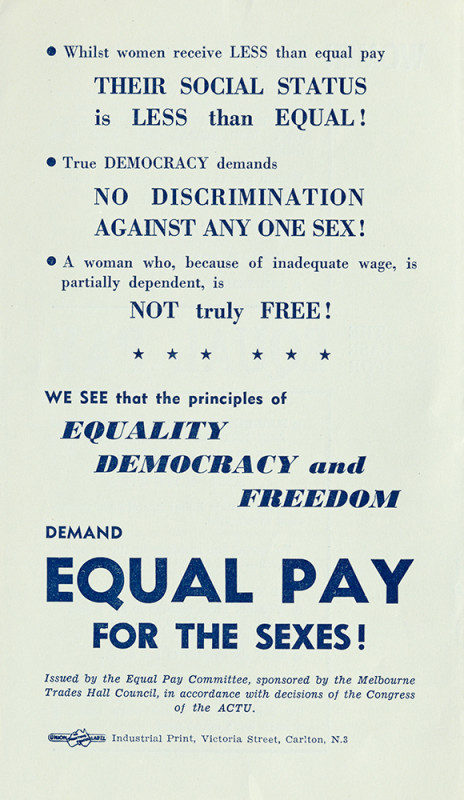Equal Pay Case
19 June 1969
Australian women are entitled to equal pay for equal work.
Although in the 1960s a significant proportion of the Australian workforce were women, they were paid up to 40% less than men for doing the same work. After years of protesting and lobbying for better pay for women, in 1969 a case was brought to the Australian Conciliation and Arbitration Commission challenging the difference between men and women’s wages. In a landmark decision, the Commission determined women should receive ‘equal pay for equal work’, that is, where women and men did the same work they should receive the same pay.
Three years later only 18% of women workers had benefited from the decision. A second decision in 1972 resulted in ‘equal pay for work of equal value’. Instead of comparing male and female jobs to determine if they were basically identical, work was now compared to see if it was similar in terms of content or tasks.
Despite these achievements there is a still a pay gap between women and men. Laws including the Sex Discrimination Act 1984 and Equal Opportunity for Women in the Workplace Act 1999 have strengthened the fight for pay equality.

Equal pay for women: ephemera material in the Riley Collection
National Library of Australia, RIL 2485
Equal pay for women: ephemera material in the Riley Collection

National Library of Australia, RIL 2485
Description
This printed material includes statements such as 'Whilst women receive LESS than equal pay THEIR SOCIAL STATUS is LESS than EQUAL! This 'equal pay for the sexes' material was produced by the 'Equal Pay Committee, sponsored by the Trades Hall Council, in accordance with the decisions of the Congress of the Australian Council of Trade Unions.' Trade Unions challenged the differences in wages of men and women in the 1960s by raising the issue with the Australian Conciliation and Arbitration Commission.